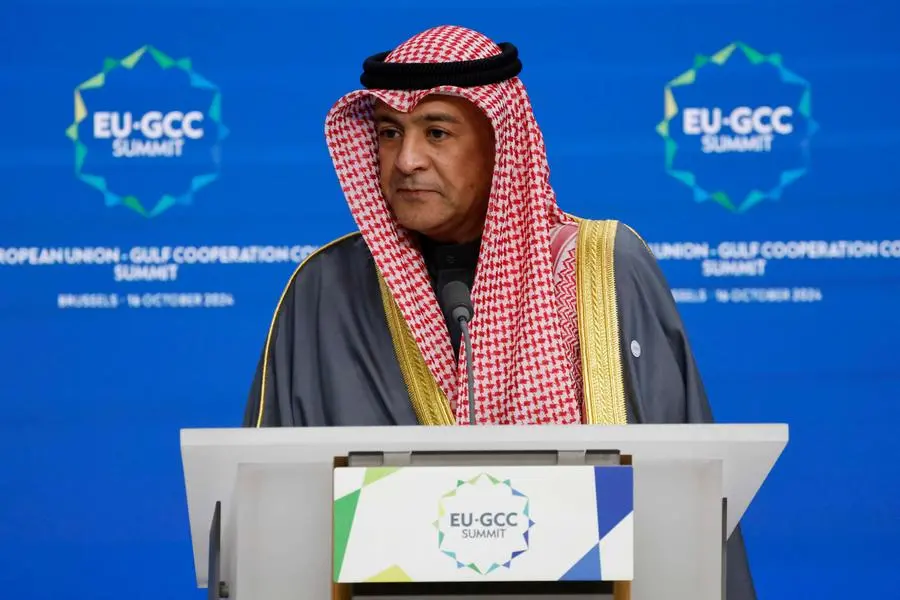PHOTO
Brussels: Secretary General of the Gulf Cooperation Council (GCC) Jasem Mohamed Albudaiwi affirmed today that the first joint summit between the GCC and the European Union (EU) demonstrates both sides' understanding of the significance of strengthening their political and economic ties, underscoring that this enhancement is essential to fulfilling their mutual aspirations and advancing their strategic partnership into broader horizons across multiple sectors.
The secretary general's statement was made during the first joint summit for the leaders and heads of state from both the GCC and EU member countries, co-chaired by Shaikh Tamim bin Hamad Al Thani, the Amir of the State of Qatar and current President of the GCC, and Charles Michel, President of the European Council, held today in the Belgian capital, Brussels.
The secretary general expressed his heartfelt gratitude to Charles Michel for hosting this historic summit, which reflects the strategic partnership between the two parties and the ongoing friendship and cooperation between the GCC and the EU, thereby enhancing opportunities for growth, prosperity, and stability in both regions.
In his remarks, Albudaiwi highlighted that, according to the cooperation agreement signed by both sides in 1988 and the Joint Action Programme for the period 2022-2027, which includes constructive mechanisms and proposals for cooperation in political, security, economic, and other fields, this distinguished relationship is a source of pride due to its high standing on many fronts, including political coordination, energy cooperation, and academic, health, and cultural collaboration.
He noted that the strategic partnership holds great potential to achieve higher economic, political, and security integration levels and enhance communication between our peoples.
Albudaiwi also pointed out that the threats and challenges facing our world today necessitate ongoing consultation and collective action to maintain cooperation among our nations in all fields, thereby achieving security, growth, and stability for both regions and the wider world.
He emphasized that the Gaza Strip is suffering under the weight of a war waged by Israeli occupation forces, with innocent Palestinian civilians bearing the brunt of the consequences.
"While we express our deep sorrow and frustration over the atrocities inflicted upon our Palestinian brothers and sisters, we reaffirm the GCC's long-standing position advocating for an immediate and complete cessation of hostilities and the unrestricted entry of humanitarian relief teams.
Additionally, we categorically reject the forced displacement of civilians in Gaza and stress the need to adhere to international law and humanitarian law. This mandates that we take necessary measures to advance collective efforts to halt this war and pressure Israel to permit humanitarian aid to reach the Palestinian people," Albudaiwi said.
He added that the failure to achieve a ceasefire in Gaza has led to escalating tensions in Palestinian territories and a spillover of conflict into Lebanon.
"Developments in the Red Sea and attacks on commercial vessels have disrupted trade supply chains, causing substantial losses for exporting and importing countries and significantly increasing consumer prices. The GCC has consistently emphasized the importance of de-escalation, exercising maximum restraint, prioritizing political solutions, and promoting dialogue and negotiations.
"We aim to spare the region and the world from further instability and the dangers of war and destruction and their devastating impacts on the peoples of the region and beyond. Reviving the peace process in the Middle East to fulfil the Palestinian people's aspirations for establishing an independent state with East Jerusalem as its capital, based on the 1967 borders, remains the sole path to achieving security and stability in the region," he explained.
Albudaiwi emphasized the GCC's ongoing efforts to resolve the crisis in Gaza and other Palestinian territories, highlighting the significant and valuable roles of the Kingdom of Saudi Arabia and the State of Qatar.
"Their continuous efforts are being coordinated with international partners and the ministerial committee led by Saudi Arabia, which was formed based on the outcomes of the extraordinary Arab-Islamic summit," he stated, reiterating the importance of the "International Coalition for Implementing the Two-State Solution," launched by Saudi Arabia with the participation of Arab and Islamic countries and European partners, aimed at achieving a Palestinian state in line with relevant UN resolutions and the Arab Peace Initiative.
He also recalled during his speech that the GCC has always emphasized in Ukraine the importance of respecting the principles of international law and the UN Charter, maintaining the international order based on respect for state sovereignty, territorial integrity, and political independence, as well as non-interference in internal affairs and the prohibition of the use or threat of force. "The GCC countries have made efforts to resolve the crisis between Russia and Ukraine, advocating for a ceasefire, a political solution, and prioritizing dialogue to settle disputes through negotiations, alongside their efforts in facilitating prisoner exchanges between the two sides," he stressed.
He expressed sincere gratitude to the president of the European Council for his leadership and active role in enhancing relations between the GCC and the EU. He praised Michel's vision and continuous support, which have greatly contributed to developing the GCC-EU strategic partnership and "enhancing cooperation with the region."
He also commended Josep Borrell, the High Representative of the EU for Foreign Affairs and Security Policy and Vice President of the European Commission, for his significant contributions to strengthening relations between the GCC and the EU during his tenure.
Albudaiwi expressed his hope and confidence that this historic summit would serve as an additional starting point for deepening cooperation and partnership between the GCC and the EU, leading to outcomes that enhance stability and prosperity in both regions and worldwide.
"I believe that the future of cooperation between us is promising, with great potential to fulfil our people's aspirations for greater economic, political, and security integration. I hope this summit will pave the way for a brighter future that realizes our shared dreams of building a more peaceful and prosperous world," he concluded.





















